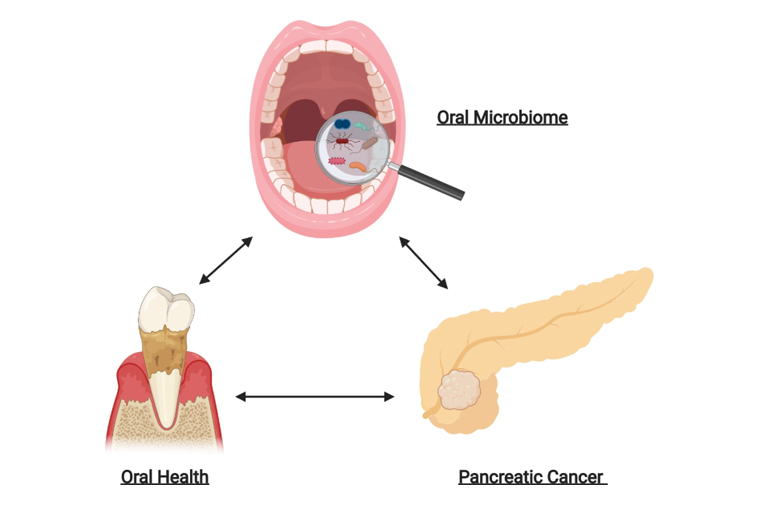Pancreatic cancer, originating in the tissues of the pancreas, is notably aggressive and difficult to detect early, often remaining undiagnosed until its later stages. Advanced pancreatic cancer symptoms include jaundice, upper abdominal pain, dark urine, itchy skin, nausea, and fatigue. Identifying contributing factors is crucial for mitigating the risk of pancreatic cancer. Notably, Porphyromonas gingivalis, a bacterium commonly linked to gum disease, has been detected in higher levels in the saliva of individuals with pancreatic cancer.
Research indicates that this bacterium may contribute to cancer development by fostering an inflammatory environment and potentially residing within cancer cells. Although Porphyromonas gingivalis is the most extensively studied, other oral bacteria might also play a significant role in the risk of developing pancreatic cancer.
How Poor Oral Hygiene is Linked to Pancreatic Cancer Risks:
Inflammation:
Oral bacteria can trigger inflammation, a known risk factor for various cancers. Poor oral hygiene can lead to chronic inflammation in the mouth, such as periodontitis (gum disease), which can release inflammatory markers into the bloodstream, potentially affecting other parts of the body, including the pancreas.
Direct Impact on Pancreatic Cells:
Some research suggests that these bacteria can directly harm pancreatic cells, further triggering cancer development. Harmful oral bacteria may travel to the pancreas and contribute to an environment conducive to cancer.
Altering the Pancreatic Environment:
The presence of oral bacteria in the pancreas can create conditions favorable for cancer cell growth. These bacteria and inflammatory mediators can activate molecular pathways that promote cancer, leading to changes in pancreatic cells, including increased cell proliferation and decreased apoptosis (programmed cell death).
Cautions and Future Directions:
Pancreatic cancer is a complex disease influenced by various genetic, environmental, and lifestyle factors.
- Smoking: A major risk factor that significantly increases the likelihood of developing pancreatic cancer.
- Chronic Pancreatitis: Long-term inflammation of the pancreas can lead to cancer.
- Diabetes: Both a risk factor and a potential consequence of pancreatic cancer.
- Obesity: Excess body weight is linked to an increased risk of many cancers, including pancreatic cancer.
- Family History: A history of pancreatic cancer in the family can increase risk.
Exposure to Chemicals and Heavy Metals Exposure to chemicals and heavy metals such as beta-naphthylamine, benzidine, pesticides, asbestos, and benzene can also contribute to the risk of pancreatic cancer.
Physical Activities Engaging in regular physical activities can lower the risk of pancreatic cancer compared to a sedentary lifestyle.
Disclaimer:
The information contained in this article is for educational and informational purposes only and is not intended as a health advice. We would ask you to consult a qualified professional or medical expert to gain additional knowledge before you choose to consume any product or perform any exercise.








